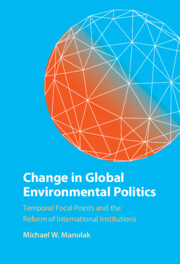Crossref Citations
This Book has been
cited by the following publications. This list is generated based on data provided by Crossref.
Long, Tom
and
Schulz, Carsten-Andreas
2023.
Compensatory Layering and the Birth of the Multipurpose Multilateral IGO in the Americas.
International Organization,
Vol. 77,
Issue. 1,
p.
1.
Beaudoin, Simon
2023.
Revue historique de la gouvernance mondiale de l'environnement (1945–2022).
Canadian Journal of Political Science,
Vol. 56,
Issue. 4,
p.
790.
Manulak, Michael W.
2023.
Toward a Super-COP? Timing, Temporality, and Rethinking World Climate Governance.
Global Environmental Politics,
Vol. 23,
Issue. 1,
p.
3.
Volpi, Alessandro
and
Cera, Agostino
2023.
Beyond Neoliberal Presentism: An Eco-Temporality for the Anthropocene .
Anthropocenica. Revista de Estudos do Antropoceno e Ecocrítica,
Vol. 4,
Issue. ,
p.
3.
Morin, Jean-Frédéric
Allan, Jen
and
Jinnah, Sikina
2024.
The survival of the weakest: the echo of the Rio Summit principles in environmental treaties.
Environmental Politics,
Vol. 33,
Issue. 3,
p.
486.
Manulak, Michael W.
2024.
The sources of influence in multilateral diplomacy: Replaceability and intergovernmental networks in international organizations.
The Review of International Organizations,
Vol. 19,
Issue. 3,
p.
579.
2024.
Sustainable Development, International Law, and a Turn to African Legal Cosmologies.
p.
107.
Falkner, Robert
2024.
The Longue Durée of International Environmental Norm Change: Global Environmental Politics Meets the English School of International Relations.
Global Environmental Politics,
Vol. 24,
Issue. 1,
p.
124.
2024.
Sustainable Development, International Law, and a Turn to African Legal Cosmologies.
p.
105.
Green, Jessica F.
Hale, Thomas N.
and
Arceo, Aldrick
2024.
The net zero wave: identifying patterns in the uptake and robustness of national and corporate net zero targets 2015–2023.
Climate Policy,
p.
1.
Thompson, Alexander
2024.
Contestation and Resilience in the Liberal International Order: The Case of Climate Change.
Global Studies Quarterly,
Vol. 4,
Issue. 2,



